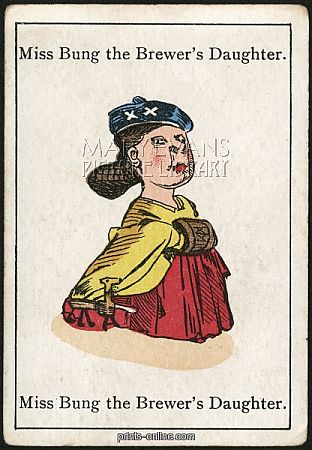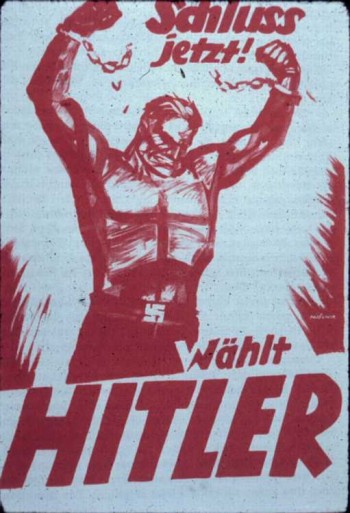My parents taught me and my siblings the card game Happy Families with the rule that if you forget to say “please” asking for a card, you revoke and lose your turn.

The rule now applies to elections in Jersey:

I’m not going to read much into this. Politicians are chameleons and any of the current crop of US Presidential hopefuls, with the possible exceptions of Rudy Giuliani and Newt Gingrich, would adapt to the meme easily enough. It’s still a pleasing convention that helps keep the public discourse civilised, and reminds candidates that it’s a favour they are asking of us.
There are some well-known candidates for electoral office whom it’s hard to imagine saying “please”: Julius Caesar, Louis-Napoleon Bonaparte, V.I. Lenin, Benito Mussolini, and Adolf Hitler come to mind. (Spot the odd man out; answer below the jump.) Could you amend this 1932 poster

to read  I don’t think so. Anything that makes life a bit more difficult for such men is worth it.
I don’t think so. Anything that makes life a bit more difficult for such men is worth it.
***************************************
The odd man out is Lenin, who lost.
Julius Caesar: elected to various offices between 69 and 59 BC - military tribune, quaestor, pontifex maximus, praetor, consul;Â votes unknown
Louis-Napoleon Bonaparte: elected President of the Second Republic 1848, with 75%
V.I. Lenin: lost 1917 elections to the Constituent Assembly in November 1917, by 23.5% to the SR’s 43%
Benito Mussolini: won 1923 election after coup d’état by 64% (with heavy intimidation)
Adolf Hitler: won 1932 election as largest party by 33%; confirmed by 44% win in 1933 election with heavy intimidation after Hitler became Chancellor.
Fidel Castro was running for national office in 1952 as a member of a left-wing party when Batista’s coup preempted the Cuban election. Castro never repeated the experiment. SFIK neither Mao, Ho Chi Minh, nor Kim Il Sung ever stood for election.
My German is more of a reddish stain than merely rusty, but I think “Waehlt” would be the imperative, can’t be combined with a respectful form of address, and couldn’t really fit with “Please”. More like “Bitte Waehlen Sie Hitler”.
Warren is correct.
I disagree, and my German used to be more than rusty. “Wählt” is simply the second person plural imperative (informal, intimate); the “ihr” (= du + du +..) is implied. It goes perfectly well with “bitte”. Until an native speaker or professor of Germanic languages corrects me.
Elections in Caesar’s day were typically bought with a combination of cash and personal loyalty. I imagine he was polite enough to say please as necessary.
Not a native speaker, but lived in Berlin for a couple of years. I’ve never seen “bitte” used with that imperative. Not sure if it’s technically incorrect, but it doesn’t sound right to me.
Not a native, but I’ve lived more than a third of my life in Germany (and am no longer young). Warren is wrong, but in practical terms he might as well be right.
There is no technical reason why one could not say “bitte” when using the 2nd pers plural “familiar” imperative. But as often as not, one doesn’t.
More to the point, to use the 2pp in a public communication of this sort, esp. back then, was to strike a self-consciously Joe-the-Plumberseque attitude. I am reminded, oddly, of a left-wing poster of roughly the same (Weimar) era, urging workers to avoid strong drink lest it ruin them physically, morally and financially: “Arbeiter, meidet den Schnapps!” In either case, no “bitte” needed, you’re talking to comrades (and remember, when the nazis still had to ask for your vote, they were still pretending to be a left-wing, working-class party). I hear (2pp + “bitte”) a dozen times a day in my workplace (almost all my German colleagues avoid the 3pp formal address in an attempt to be hip and informal and Americanesque), but in the context of the nazi election poster (or the socialist temperance poster), “bitte” would be technically permissible but tone-deaf.
I have two native Germans sitting with me who say “Waehlt X, bitte” to their ears isn’t quite incorrect, but is a bit awkward. The more natural way of putting it (again, to their ears) would be (as Warren suggests) “Bitte waehlt (oder waehlen Sie) X.”
Thanks for that game.
Ralph Hitchens: and what exactly is the difference between Julius Caesar’s campaigning methods and say Rick Perry’s?
“Ralph Hitchens: and what exactly is the difference between Julius Caesar’s campaigning methods and say Rick Perry’s?”
Rick Perry only *wishes* he’d killed or enslaved a million Gauls to build his campaign chest.
Caesar’s impeccable manners are well illustrated by the incident when he first occupied Rome in 49 and went to confiscate the treasury (which the Pompeians had insanely left behind). Metellus the tribune barred the way, upon which Caesar suavely advised him that if Metellus didn’t stand aside, he would be cut down — “and you know that such things are more difficult for me to say than to do.” Metellus took the hint.
Ho Chi Minh, [n]ever stood for election.
Of course it was the US expectation that he would win that caused US to prevent election being held in 1956
The following quotes are taken from The Pentagon Papers:
“In 1956, almost any type of election that could conceivably be held in Vietnam would, on the basis of present trends, give the Communists a very significant if not decisive victory.”
“Nationalist appeal in Vietnam is so closely identified with Ho Chi Minh and the Viet-Minh movement, even in areas outside communist control, candidates and issues connected with ‘nationalism’ and supported by the Viet-Minh would probably be supported by the majority of the people.”
Johnny, I was in South Vietnam when the 1970 “election” was held.
After the announcement that the major collaborator had been re-elected, I asked the Vietnamese on compound who was the President of South Vietnam. All of them that understood the question didn’t hesitate. Ho Chi Minh.
Minh had died the previous year.